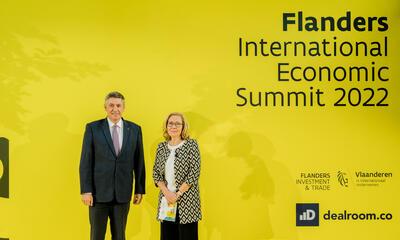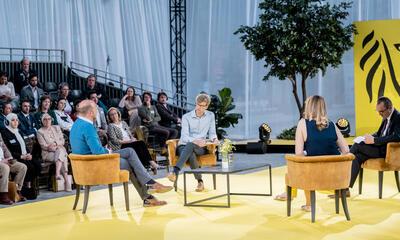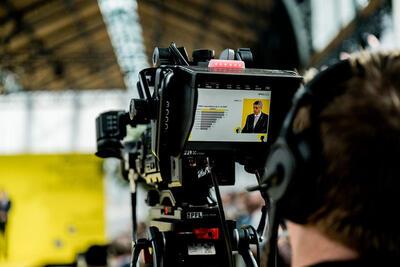Flanders International Economic Summit 2022 (FIES) in 3 takeaways
Entrepreneurs, partner organizations, sector associations, EU officials, economic advisers and diplomats all came together for the third edition of the Flanders International Economic Summit (FIES). Following a digital occasion in 2020, it was possible to return to a physical gathering on 28 April 2022. As usual, the menu included: the hot trends in internationalization and the challenges for our region.

During her opening speech, FIT-CEO Claire Tillekaerts referred to the uncertain geopolitical context in which businesses must currently operate: “Many difficult challenges are keeping us awake these days. Yet we must retain our long-term vision and continue to believe in our own abilities. So rather than sticking to the sidelines, it’s about demonstrating agility and continuing to move forward.”
Furthermore, Claire Tillekaerts thanked the European Regional Development Fund (ERDF) for its support in a number of FIT projects relating to digitalization. This transition, together with greening, will shape our future. Both were therefore ongoing elements throughout FIES. The debates and interviews were in the expert hands of presenter and moderator Pieter Haeck, Tech Reporter for Politico Europe. Three takeaways:
1. Start-up ecosystem is important driver for Flanders’ economy
For the first time, the fact we can have high expectations of the Flanders-based start-up community, is confirmed in ‘The State of Flanders Start-up Ecosystem 2022’. The data collection and analysis behind this was provided by Dealroom, the Dutch data specialist, who is also responsible for the intelligence in the online platform which supports the start-up ecosystem and which bears the same name. The report and platform were unveiled by Minister-President of Flanders, Jan Jambon.
This report highlights several interesting figures and trends. For example, the fact that today’s tech landscape in Flanders boasts more than 2,000 start-ups, with a total business value of around EUR 32 billion. Jan Jambon: “The growth in our start-up ecosystem in Flanders has been spectacular over the last five years. And now is the time to reap the rewards. As well as to maximize efforts for Start-up.Flanders, the global brand identity for our tech region with which we aim to attract more foreign start-ups.”
It is clear that many of our start-ups cannot wait to spread their wings internationally. Deliverect flew forward several years ago with its application for restaurants to manage online sales channels. Zhong Xu, CEO from Deliverect, experienced the importance of the start-up ecosystem in Flanders for himself, with FIT as a spider in the web. From now on, the Dealroom database ‘Flanders Tech Ecosystem’ will be the digital gateway to funding, incubators, partnerships and global opportunities.
It is an interesting fact that 3.3% of the gdp in Flanders is dedicated to Research & Development, according to Dealroom CEO Yoram Wijngaarde: “Flanders is top in Europe when it comes to R&D funding. Conversely, the region scores very low in terms of venture capital per capita. The digital ecosystem can become a flywheel for investments, thus creating even more and faster innovation in a wide range of sectors, including pharma, life sciences and cleantech.”
When it comes to innovation in pharma, miDiagnostics has a primeur. The start-up from Leuven has just launched its PCR test, which provides accurate test results within less than 15 minutes. Katleen Verleysen draws attention to the importance of capital from the US within her niche. Her tip for fellow start-ups: “American venture-capital providers invest in people and a team. So don’t devote all your precious time to business plans and endless sheets of Excel, because then you’ll risk losing to the competition.”
2. 2. E-commerce is growing steadily, but sustainability challenge remains
Growth in the e-commerce market went up a gear during the corona pandemic and steady growth is expected to continue in the coming years. Maarten Bodewes, CEO from Loop Earplugs, explains in a video testimonial how a review in the New York Times suddenly opened the doors of a gigantic American market: “Ear plugs are fortunately rather small, and therefore easily shipped all over the world.”
The rise in e-commerce is good news for employment, however, a sustainable approach is challenging. bpost CEO Dirk Tirez agrees: “At bpost we are investing in electric vehicles, a network of collection points and lockers. Yet it remains a tricky balance between a sustainable approach on the one hand and meeting the desires of demanding customers on the other.”
According to Heleen Buldeo Rai, postdoctoral researcher at the Université Gustave Eiffel and author, there is no miracle solution to make e-commerce more sustainable: “It is a combination of many factors, including the multimodal development of the logistics chain, but equally avoiding the returns, or higher delivery costs for those choosing a less sustainable alternative.”
The postdoctoral researcher views Paris as one of the better students, since the city uses the space available creatively: “Empty car parks are used as buffer stock in order to fill up cargo bikes. These cover the last kilometers up to the end customer.” Start-up Budbee is also focusing on this crucial ‘final mile delivery’ in Flanders. In addition to cargo bikes, Country Manager Matthias Pletinckx is also particularly proud of the company’s algorithm to make delivery rounds as efficient as possible.

3. 3. International trading enters a new phase with geopolitical situation
Digitalization and greening will shape the future of our economy, however, both transitions are marked by a highly unstable geopolitical situation. This matter was considered by Roel Vandenbulcke (CEO at Hysopt), Sabina Ciofu (Associate Director of trade organization techUK) and Koen De Leus (Chief Economist at BNP Paribas Fortis) during the end debate.
“The rocketing energy prices will really hurt our economy”, emphasizes Koen De Leus. “Furthermore, many companies risk ending up in troubled waters, which means a recession is possible. After thirty years of globalization, we may end up in a new reality of regionalization. The business world must adapt: the new motto will be ‘just in case’ rather than ‘just in time’.”
“A number of geopolitical transitions are underway”, confirms Sabina Ciofu. “The transatlantic partnership that had started to shake loose in the past is back with a vengeance. The war in Ukraine was a wake-up call for nations to return to the table and strengthen their ties.”
“Within this new reality, start-ups and small businesses are a step ahead thanks to their agility,” points out Roel Vandenbulcke. “They can experiment, evaluate, finetune and even fail, without being concerned with their business image or company structures. Which is exactly why they are the perfect breeding ground for innovation.”

Would you like to watch all the debates at FIES?
You can re-live the event in the after-movie or photo report.
Or read more about the projects launched by FIT with support from the European Regional Development Fund (ERDF) and Flanders Innovation and Entrepreneurship (VLAIO).
